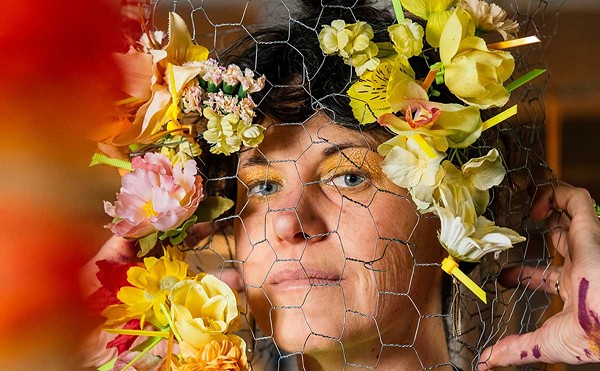The Last Holiday: A Memoir
Gil Scott-Heron
$25; 318 pp.
Grove Press
The last time I saw Gil Scott-Heron in concert was 1984 in Bremen, West Germany. At the time, I was a Fulbright professor, teaching American literature, writing peace poetry in two languages and collaborating with jazz musicians. Ironically, the historical moment was similar to the radicalism of the 1960s and '70s that ushered in Gil Scott-Heron.
In a face-off on the border between East and West Germany, the United States deployed Pershing II missiles and the Soviets matched the threat with similar nuclear weapons. Meanwhile, the anti-war movement escalated its nonviolent resistance to dissuade the superpowers from igniting their "limited nuclear war." So, when Gil Scott-Heron arrived, his audience was largely peace protesters who identified themselves as '68ers, a term rooted in the German activism that developed in 1968 in tandem with the civil rights movement and peace movement in the States. His "Winter in America" acquired heightened meaning under perilous circumstances:
Just like the cities stagger on the coastline
In a nation that just can't stand much more.
Just like the forest buried beneath the highway,
Never had a chance to grow...
Now it's winter in America ...
And ain't nobody fighting cause
Nobody knows what to say
Save your soul, Lord knows, from
Winter in America
As an American nurtured in the politics and aesthetic attitudes of that era, Gil Scott-Heron discusses the major influences on his artistry and his character in his memoir The Last Holiday, including his upbringing, his education, his activist college years, his early publishing success, his challenges in the music industry, and his music business relationships.
Unfortunately, it was left unfinished when he died last year, and writer-editor Tim Mohr was recruited to stitch together the pieces and edit-in missing parts. Consequently, the memoir reads unevenly at times. However, it is still an amazing story.
Born on April 1, 1949, in Chicago, Scott-Heron (like many African-Americans) was raised by his grandparents. He came of age during the civil rights movement, and he was profoundly affected by critical moments, especially the assassinations of Medgar Evers and Dr. Martin Luther King Jr. Indeed, the memoir takes its title from Scott-Heron's involvement with Stevie Wonder's quest to establish the King holiday. Scott-Heron's lifelong friendship with fellow industry maverick Wonder is a big part of the book.
Scott-Heron's early years were split between Chicago; Jackson, Tenn., where he lived with his grandmother; and New York City. Each of these places contributed particular advantages. His mother, who was college-educated, taught him to read when he was only 4 years old; white authority never intimidated her, an attitude she transmitted to her son. A progressive, supportive mother, Bobbie Scott even came up with a key line, "Whitey on the Moon," which became the title of one of her son's most famous pieces.
But when Gil Heron, his father, a Jamaican veteran of the Canadian Air Force, left the United States to play for a professional soccer team in Scotland (later to settle in Detroit), Bobbie sent her son South to live with her mother in Jackson.
His education in a segregated elementary school, and then at an integrated high school in the South was uneventful; but more importantly, the black community nurtured him, and introduced him to the blues. When he reunited with his mother in New York, he attended a virtually all-white, privileged prep school that was a 60-minutes bus ride from his home in a Chelsea housing project. After graduation, he reversed the demographics, and attended a historically black college, Lincoln University in Pennsylvania. Living in various settings in the country and interacting with diverse ethnicities and classes, appears to have honed a socially and culturally complex artist.
His path to fame was unusual and impressive. He requested a leave of absence from Lincoln in his freshman year, 1968, to finish his first novel, The Vulture. It was published a year later along with his first poetry collection, Small Talk at 125 and Lenox.
Upon his return to Lincoln University, he spent much of his time listening to jazz greats, instead of studying. He became a student activist after a close friend and musician needlessly died from an ineptly treated asthma attack. Scott-Heron led a protest that secured an adequately staffed and stocked campus clinic to handle such emergencies.
Scott-Heron's poetry and music were in accord with his activist generation. At Lincoln, he began writing songs with fellow-student Brian Jackson for their group, Black and Blues; Jackson subsequently became his musical arranger. In 1970, Scott-Heron released a mostly poetry-with-percussion album, again titled Small Talk at 125th and Lenox, and from this record "Whitey on the Moon" and "The Revolution Will Not Be Televised" received considerable airplay. About his creative process Scott-Heron said:
I had an affinity for jazz and syncopation, and the poetry came from the music. We made the poems into songs, and we wanted the music to sound like the words, and Brian's arrangements very often shaped and molded them.
It was about this time that Scott-Heron befriended the percussion-and-poetry group the Last Poets, founded in 1968 in Harlem. (The original Last Poets were Detroiter David Nelson along with Felipe Luciano, Gylan Kain.) Like Scott-Heron's work, theirs was politically charged. As Scott-Heron explains:
I thought they were bringing a new sound to poetry, and to the community, and I enjoyed it. I was a piano player and still played with different groups, and the songs and poems I had written had a musical tilt to them because they were compositions as opposed to poems over rhythms ... but we were going in the same direction.
In fact, the similarities were so strong between his poetry and the Last Poets' that many people continue to confuse them, especially when it comes to his poem "The Revolution Will Not Be Televised." The success of Small Talk led to his first musical album, Pieces of a Man, which he recorded with major jazz artists Ron Carter, Hubert Laws and Bernard Purdie. Before long he was recording with his own bands, and for a time he was a certifiable star. Even as his career faltered in the '90s and on, he was hailed as a progenitor to the rappers. At the same time, he identified himself as a jazz musician, and criticized rappers' ignorance of history and tradition. "Make sure you know the real deal about past situations," he admonished.
The first half of the book, which focuses on his developmental years and the period when his career flourished, is the most cogent and engaging. Scott-Heron's recollections are clear, detailed, and presented with historical context and hindsight that is revealing and honest. Yet, he scantily discusses his romances or his children. He also omits the debilitating impact that drugs had on his life.
The Last Holiday illuminates the integrity and creativity of one of the most influential poet-musicians of a generation. By example, his work encouraged my collaboration with jazz in the creative process and with musical compositions for poetry performances.
Gil Scott-Heron died last year at age 62, leaving a legacy of 20 albums, two novels and two collections of poems — works that captured national and international audiences, that brought attention to the political struggles of African-Americans, and that helped to expand the popular perception and reception of what poetry could be.
Melba Joyce Boyd is distinguished professor and chair of the Department of Africana Studies at Wayne State University. Her most recent collection of poetry, Death Dance of a Butterfly, was just released by Past Tents Press (2012).





